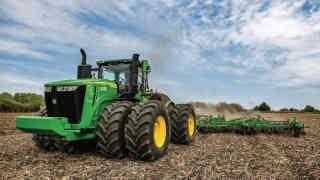As agricultural producers look for more efficient, sustainable ways to improve their operations, electrification is growing in popularity across the industry. John Deere, for instance, acquired a majority interest in Kreisel Electric in 2021, which specializes in the development of electric battery modules and packs. This is just the beginning of an era when farmers tap into the benefits of modern technology to reduce the impact of their carbon footprints.

What Does Electrification in the Agriculture Industry Mean?
Electrification in agriculture also known as “fuel switching.” Electrification allows farmers to rely less on other energy sources, such as diesel, which ultimately benefits their bottom line while also reducing their carbon emissions. Making the switch from fossil fuels, even in a small way, also allows agricultural producers to automate more daily processes and streamline their operations for greater efficiency.
What are the Benefits of Agricultural Electrification?
Some of the immediate benefits of agricultural electrification are reduced costs, increased connectivity, and more sustainable daily operations. Let’s take a closer look at the highlights that come with going electric.
Cleaner Air for the Region
By switching from fossil fuels to electricity, farmers are not only reducing their carbon footprints, but also benefiting their communities. Ultimately, the limitation of carbon emissions can benefit the air in their local areas, helping everyone around them breathe easier.
More Efficient Technology
The diesel engines used in agricultural equipment, such as tractors and combines, do not operate as efficiently as their electric counterparts. Leveraging electricity not only increases efficiency but also eliminates the need to stop and refuel on a regular basis, leaving more time available for essential tasks.
What are the Challenges of Electrification in the Agricultural Industry?
Despite the strides that have been made in electrifying agricultural machinery, the industry as a whole still faces some challenges. Charging infrastructure, for instance, remains a concern for farmers who are interested in battery-powered equipment. Durability and reliability are also still issues, as many of these newer pieces of machinery cannot be repaired as quickly as those that have been on the market for years. However, farmers are expected to be able to overcome these hurdles as the costs of renewable energy and batteries fall over time.
Click here to see more...